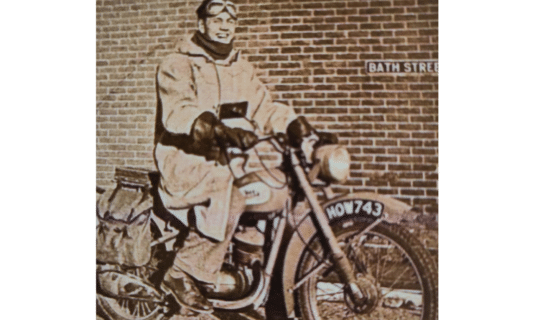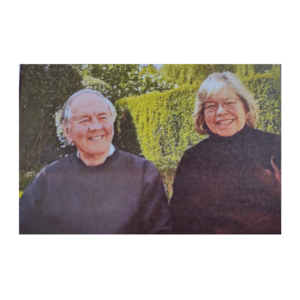
Mr John Tangye Chambers
Class of 1947
John Chambers (Tilly’s, 1943-1947)
Died on 5th May 2023
The below obituary was kindly provided by Michael Halliwell (Tilly’s, 1942-1946).
John Chambers was born on 3 July 1929 in Rondebosch, a suburb of Capetown in South Africa, where his father Gilbert John Marion Chambers was an assistant priest. On his father’s side John was descended from John Chambers, an emigrant to New Zealand who established a business importing mining and agricultural machinery. On his mother’s side he was descended from Sir Richard Tangye whose hydraulic engineering works won a contract from Brunel to construct machinery for the launching of the Great Eastern.
The family moved to England in 1935 and in 1937 John’s father became Rector of Nursling, near Southampton. During the Southampton ‘blitz’ in 1940, John and his sister often slept in the cellars. One day they woke to find a large hole in the driveway just by the front door. It was thought to be an unexploded anti-aircraft shell, and the house had to be evacuated.
John was sent to the prep’ school Pilgrims, in Seaford and on the outbreak of the Second World War, the school was evacuated to the safety of the West Country. In 1941 John’s father volunteered for service as a Forces’ Chaplain. That autumn he visited his son at school to say good-bye to him before sailing to the Far East. During the school holidays towards the end of the war, John and some friends would go into the New Forest where there was an army training ground. They would pick up live ammunition which was lying around. They would bring them home and experiment firing with an air gun at the explosive caps of the ammunition. No one was ever hurt, but on returning years later from his Military Service, John threw his entire collection into the River Test.
In September 1943 John went to St Edward’s, joining his school friend Michael Halliwell in Tilly’s House. They had both been separated from their fathers. John Chambers knew little of his father’s fate in the war against Japan, Michael Halliwell’s father was confined by the German occupation of Jersey. In an article written for the ‘Chronicle’ in 2009 John gives a candid portrait of ‘Teddies in Wartime’
“I joined St Edwards in 1943 in the middle of the Second World War, a period of turmoil for everyone – including school authorities and pupils. Boys leaving then had no choice but to join one of the armed services and put their lives on the line.
I remember the School as being largely staffed by people, mostly men, who for reasons of age or physical disability were ineligible for military service. Among them was my Housemaster Arthur Tilly, a bachelor, who had been gassed in the First World War. I still vividly recall the shock of being woken up to the sounds of window glass being broken when he was having a nightmare reliving a traumatic period of his life.
Old Mr Tilly remains clearly in my memory for many reasons but partly because, after I had been in the school for about three weeks, he brought me a letter from a clergyman and his wife whom I had met the night before I came to the School, when I was staying with my mother at a hotel near Magdalene Bridge. He explained that he had kept back the letter because “We don’t let new boys have letters early on”. The letter had been an invitation out to lunch two weeks previously, so I was embarrassed as I wondered what the writer had felt about being ignored.
Warden Kendall also a bachelor, was basically a kind man, even though he did almost make me feel that it hurt him more than me when I got caned in his study! I remember walking across the Quad in the summer of 1945 wondering whether he would tell me that my father, an army chaplain, who had been a P.O.W in Singapore since February 1941 was dead. How extraordinary my premonition was because that is exactly what he did have to do and he did it with compassion and understanding. I was sent home for a week.
The School was run then, as I presume it is today, with a pyramid structure extending downwards from the Warden through Housemasters, Teachers, House, Prefects and Day Room heads and it worked pretty well. But the powers then permitted were totally different from what would be acceptable today. Firstly there was corporal punishment both by masters and prefects. Then there was fagging whereby junior boys acted as servants for older ones. I expect this was meant to teach people to command, but it could now be said to have instilled a sense of servility in the fag which would no longer be acceptable. Looking back on it now I think it undoubtedly was unacceptable, but it was accepted then as the norm and was treated as such by both ‘master and servant’.
Restrictions on one’s liberty are undoubtedly necessary in any closed community, but especially in a boys’ boarding school in wartime, and the restrictions that were in place were pretty severe. There were no weekends off, or half terms and the extent that we were denied access to the architectural wonders of Oxford was a disgrace. I only hope that today’s pupils are shown ‘the dreaming spires’ because they are part of our culture. In the days before global warming we were able in the winter term to skate over Port Meadow, a field of many acres next to the river. Bearing in mind factors such as global warming, and possibly ‘health & safety’ regulations, I presume that this pleasure is no longer possible! I loved it.
I remember with pleasure rowing on The Thames from ‘The Trout’ to ‘The Perch’ in my house four and the pride of getting my house colours. The sporting achievements of Tilly’s House were pretty limited in that era. I recall with amusement huddles of little boys hiding behind the privet hedge that surrounded the outdoor swimming pool when prospective parents were being shown around. We bathed nude then and presumably it was felt that this might have shocked them.
I remember the embarrassment of finding myself sitting next to ‘Binks’, one of the masters, in a cinema in Oxford after forging Tilly’s signature on a ‘pass out’. He never said a word about it afterwards for which I was grateful! Then there was that extraordinary dessert that we called ‘Cinder Track’, a hard concoction of burnt raisins. Also sago pudding into which we mixed jam, and there was tapioca too. Ugh! It’s funny to remember that we didn’t have to talk at meal-times and that it was perfectly acceptable to read a book propped up against some jam jars that lined the centres of the long tables.
In the winter of 1946/7 there was a national fuel crisis and for some days or weeks, I forget which, it was decreed that we should all stay in bed in the morning for longer than usual and could forgo the horrors of a cold shower in a bath area where there was no heating. That was marvellous.
We had neither mobile phones, ipods, nor portable radios and so it was a treat to be invited sometimes into Mr Tilly’s study on a weekend evening to listen to Jimmy Handley in ITMA (It’s That Man Again), a humorous radio programme that kept the country laughing.
We wore black ties because, it was said, we were in mourning for the death of Queen Victoria some 40 odd years previously. Can that really be true? We also wore straw ‘boaters’ which the local lads from Summertown (when they were let in one day, presumably as an exercise in emancipation) took pleasure in throwing onto the blades of a high fan in ‘Big School’.
In 1946, after the war, young masters started coming back to the School full of vigour and enthusiasm to start their new lives bringing with them a wonderful breath of fresh air. As an aside I remember how we laughed at the sight of lipstick on the cheek of one of these heroes – such a thing had never before been seen in the School by us boys. This was undoubtedly the end for the old order and how refreshing that was. Alas for me my time was almost up.
Two years of National Service followed and I remember thinking at the end of my first month ‘This is like being at school but now I am being paid for it!’ During that time the sport that I had learnt at Teddies enabled me to teach others to row and win regattas in Gibraltar harbour.’
With the war’s end John learnt that his father had died as a prisoner of war in Changi Prison in Singapore, on 13th July 1945. Michael Halliwell’s father had survived until Jersey’s liberation in 1945. On leaving school in 1947 John joined up for his National Service which he spent in Gibraltar in the Royal Ordinance Corps. On the boat home he met an Estate Agent through whom he went to the College of Estate Management in London, qualifying in 1952.
At this time John met and married Gill Mure-Wood, living for some years in London. John returned to his studies, qualifying as a Chartered Surveyor. They had four children, Claire in 1957, Emma in 1959, Stephen in 1960, and Philip in 1962.
In 1975 the family moved to Hampshire, to Michelmersh near Romsey, near his sister Rosemary. Following divorce John had two further marriages; the second was to Bridget Chapman-Mortimer, who sadly died in 2002, and he is survived by his third wife Jane Chambers, whom he married in 2006.
With his gentle and friendly nature John with Jane settled well into the welcoming local community of Michelmersh and he spent some years writing a definitive history of the medieval St Mary’s Church. John and Jane used to enjoy walking together in the Hampshire lanes and the New Forest. He was especially fond of his garden which was immaculate. John was also a lifetime supporter of the Southampton Football Club, and they enjoyed visits to the opera at Glyndebourne.
Through a chance encounter in the local church, John met up with his old friend Michael Halliwell and his wife Sue, and they renewed their friendship after 65 years.
Lately, John suffered from mobility problems and his walking was reduced to a few minutes round the lanes. However, he and Jane were still able quietly to enjoy the beauty of their surroundings, sharing their common interests and enjoying the life of their local community. After a short illness John died at home on 5 May 2023. His funeral took place at St Mary’s, Michelmersh on 22 May, followed by burial in the churchyard.
If you would like to leave any messages for the family or share any memories please click here.
Print page
